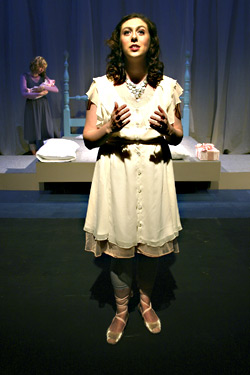If there’s a group of theater artists who feel more ill-treated by their peers than playwrights, I’ve yet to meet them. (I speak as a playwright myself.) Actors get the applause, set and costume designers get the budgets, directors get the program notes, stage managers get to bitch ceaselessly about everyone else. But playwrights have the exquisite agony of having their work not only generally rejected, but when it’s chosen, dissected, criticized, and tossed around, the plaything of would-be auteur directors, egotistical dramaturges, money-minded producers, and actors who curse the playwright every time they pick up the script to try to memorize their lines.
So it’s ironic that playwrights remain the heroes of theater. Arthur Miller, August Wilson, Lillian Hellman—these are names that even people who don’t go to theater know. Despite all the profiles written about hotshot directors and innovative companies, playwrights remain central to theater, the prime creator of text and experience—though you wouldn’t know it to listen to them.
It was inevitable that a least a couple of the events at the recent Playwrights Summit, hosted by Seattle University, Northwest Playwrights Alliance, and The Dramatists Guild, would contain lengthy bitch sessions about Seattle theater. The Monday-night Town Hall meeting at which I was a panelist included several painful postmortems of why the theaters that supported new writing 10 years ago are either dead (the Empty Space) or greatly reduced in size and scope (New City). There was even a dust-up or two about whether or not regional theaters serve anyone anymore. And I myself opined that while new play festivals (a major new trend in theaters coast to coast) were all very well, a weekend of staged readings of new works was no substitute for a couple of reserved slots for new plays in a theater’s regular season.
But something interesting happened to me during my weekend with my fellow playwrights. I got my faith back again.
In the ’90s, Seattle had three local groups vying to help out local playwrights: the Seattle Playwrights Alliance, Rain City Projects, and the Seattle chapter of the Northwest Playwrights Guild. Now only Rain City still exists, and in a greatly decreased state. Another company, Seattle Dramatists, lived for three years but sputtered out just last year. Speaking as a former president of the NWPG (1997–2000), I can’t blame any of the groups for folding. Trying to serve playwrights is like herding cats—a particularly needy, articulate, and manipulative breed of cats, each of whom has a script they want you to produce. I know a woman, a volunteer for one of these groups, who produced an evening of new play readings for local playwrights. She found the money to hire directors and actors, rented a theater, and did publicity for the event—I’m guessing she also took tickets. A week before the show, she got a phone call from one of the playwrights asking her to draw a map of where the theater was and mail it to him—he thought he might come.
But the dream that somehow the collective will of a bunch of playwrights can create something wonderful remains, or you wouldn’t have something like this summit. Gary Garrison, the cheery and personable Executive Director of Creative Affairs of The Dramatists Guild (founded in 1912), held a workshop whose primary message was simple: Know your rights. “You own your work. You own the copyright. No one can change one word in your script without your say-so.” (Playwrights, unlike scriptwriters, don’t sell their product—they continue to own the work and “lease it out,” as it were, to artists and theater companies.) “You have the right to a contract. You have the right to a royalty.” You could see the eyes of the listening playwrights widen—and you could hear their gasps when they heard that some nonprofit theaters routinely attach “subsequent rights” clauses to their contracts, taking up to 40 percent of a playwright’s royalties, in perpetuity, for all future productions of a play they stage. (The ethics of a nonprofit demanding this fee from the playwright remain astonishing to me.)
In and out of the sessions, playwrights talked a lot about new strategies to get their plays produced—working with local colleges and universities, encouraging mainstages and fringe companies to co-produce new plays, even banding together into collectives to produce each others’ work, an increasingly popular model that’s cropped up in Los Angeles (Playwrights 6), Minneapolis (Workhaus Collective), and New York (13P), among other places. Ki Gottberg—whose new show Hairy Baby opened at Seattle University’s Lee Center the weekend of the conference—mentioned that her most successful model yet was the one she followed for The Compendium of Nastiness: She wrote a play for a single actor, converted her garage into a 15-seat theater (which she called The Womb), and ran the tech herself. The show opened in late 2005 and ran for eleven months.
As for me, the more I heard about the coming conflagration that will destroy our regional theaters, the more I thought about my own heroes—Sam Shepard, David Mamet, Tony Kushner. These playwrights, and men and women like them, have been saving the theater as long as I’ve been alive. It’s time for those of us who write for the stage to stop thinking of ourselves as victims, and step up. Because history shows that time and again, every time theater experiences a resurgence into the popular culture, playwrights have led the charge.









